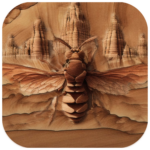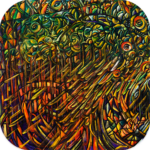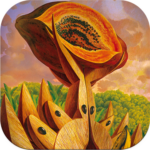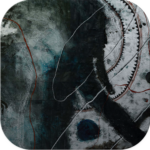About Hibiscus Mask

Q: We all wear masks don’t we—depending on the occasion and the people we’re interacting with?
RS: We do, if we choose to call social adaptations “masks.” If we imagine that an individual’s relationships are plotted on a bull’s-eye target, you might say that with acquaintances or co-workers in the outer circles, some form of accommodation is usually necessary. I’ll be a little different with Person X than with Person Y. And we all deal with people who demand an infrequently used part of our personality. But I think the word “mask” has most utility when it applies to someone who is hiding their true identity from themself and the person or persons they are closest to. The self and our most intimate relationships are, if you will, at the target’s bull’s-eye.
Q: You’ve known people like that?
RS: I have. A few. I’m sympathetic to Nitti and Kell. For some of us, there are things about our natures and histories that we can’t overcome. There are things we can’t change. To a great degree, storytelling is empowerment. In most stories, we learn how the will can accomplish its desired ends. With tragedy, we get a negative example; we learn how a particular flaw or misstep can ruin everything. And one species of tragedy, I think, is the lesson that there are things we can’t change; things the will can’t overcome.
“I put a high value on bravery. But we have to accept the fact that there are times when people can’t be brave, times when courage fails.”
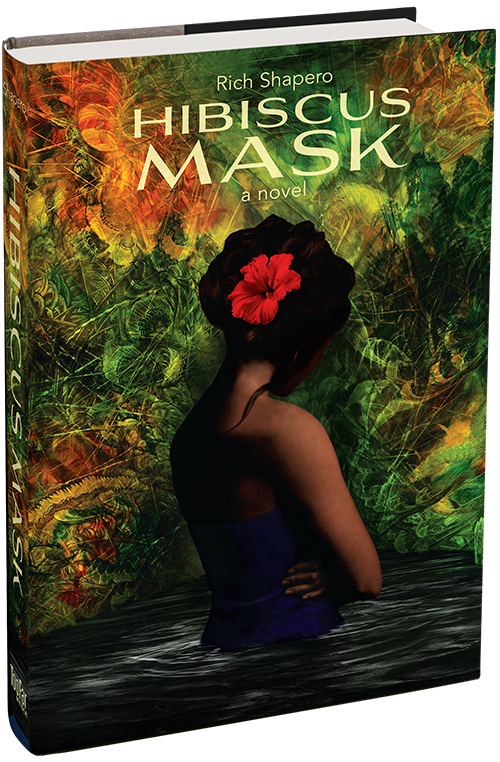
Q: Hibiscus Mask has, for me, a tonal resonance with film noir.
RS: Kell is wanting and imagining a deep connection with someone who has a handicap when it comes to making herself vulnerable. He surrenders to a partner who doesn’t reciprocate. That’s a good description of many film noir males. It’s the femme fatale’s eclipse and invulnerability that make her so dangerous.
Q: Nitti’s challenge is in expressing her need to Kell.
RS: Expressing it and baring it. The latter is the bigger challenge, I think. One of the least comfortable facts of our existence is that without need and dependency, there’s no such thing as love.
Q: The subject of this book is fear. Correct?
RS: I won’t argue with that. Courage is a paramount virtue, so it’s celebrated in story. And in my stories too. I put a high value on bravery. But we have to accept the fact that there are times when people can’t be brave, times when courage fails. And there are particular human conditions—indelible trauma, for example—that make courage impossible. Understanding that this occurs, how and why; and getting reconciled to circumstances where there is no remedy— That’s been important for me personally.
Q: In many ways, the story is a dissection of Kell’s love object. It’s a deep dive into Nitti, as well as the psychology that draws Kell to her.
RS: Our love objects, I think, are among the great mysteries of the universe. We come into the world alone, and we must leave alone. But while we’re in life, most of us mingle incredibly closely with a few others. If we’re socially deft, co-existing in relationships—simply abiding—isn’t hard. But real knowledge can be a challenge, especially with partners who have a reason to keep their deepest identity hidden.
Q: Was there some personal event that triggered this story?
RS: There was, but I’d rather not discuss it. I will say, however, that my need to explore this erupted inside me late in life. I wish I had understood these things earlier. I’m imagining that there are readers who will fathom my theme and see it as cautionary.
Q: The jungle itself plays an important role in the story, and the python’s in the lead.
RS: There’s a good reason, I think, that humans have flourished in the temperate zone. We’re less in our element in warmer locales, especially the equatorial jungle. In that ecosystem, conflict and competition are at a different level. It’s an exaggerated, magnified, intensified version of life on earth. That’s probably why Darwin and Wallace went to the equator when they were exploring the mysteries of evolution. The jungle teaches us things that might be much harder—or impossible—to learn elsewhere.
Q: You’ve spent time in the Malaysian jungle. And with giant pythons.
RS: Yes. Launching myself into an exotic setting for a story is one of my chief motivations for being a writer. It brightens and excites. It helps propel me through the completion of the work. There’s always a bit of the dare: can I share my characters’ trials; can I feel some of the mystery they feel in confronting a foreign world. The Malaysian jungle is an incredible place. And those snakes— Good god. Close contact with them is fiercely charged. They are so powerful, so sensitive; and at the same time, so cold and so ruthlessly fixed on themselves and their own needs. It’s a real reminder of where we sit in the panoply of life, and what it means to be a social mammal.
Q: Can people turn into snakes?
RS: They can. Some do. And their prey—their human victims—are among the most unfortunate among us, I think. Being exposed to a human snake can inflict a trauma that can be extremely difficult to treat or erase.
Q: The story is a psychological mystery, with a lot of analysis along the way.
RS: When you’re in love, understanding the mind and heart of your mate is that kind of challenge, isn’t it? Even with the best of outcomes, we don’t know what we’re getting into; and once we’re into it, we find ourselves laden with challenging discoveries and mandatory learning. Who can say they’re the master of that?
Q: Kell is out of his depth.
RS: And so are we all. Like you and I, he has no choice. He’s impelled by desire. “I’m in love,” he thinks, as if that confers special powers. He does what he can to make sense of confusion, with reality ill-defined and his understanding trailing behind. He imagines he has the vision to perceive complex problems and the know-how to solve them. And in fact, he has neither.

